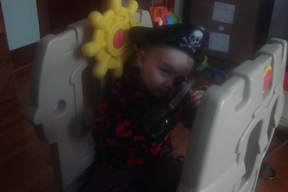 Many people don’t believe this, but I was a very shy person until about 10 or 15 years ago. My dad was also shy, but my mom was very gregarious. Mom knew everyone in town and knew how to use those connections. That helped my dad out a lot in his work as a newspaperman. He could bring her to events and meet all the important people. Everyone loved my mom and opened up to her immediately. All Dad had to do was stand there and listen. Unfortunately, my mother's outgoing personality was very hard on me. I felt as though I was always in her shadow, though she worked very hard at pushing me forward. I don't think she ever realized that the more she pushed, the more frightened I became. Now I work with children, and many of them are shy. Parents have different ways of dealing with their children’s shyness. Some of them push, as my mom did. Some parents do all the talking and interacting for them. Other parents ignore the shyness and let it take its own course. I always recommend the last tactic. Ignoring the shyness while continuing to support them and encouraging interaction at home seems to be the best way to help. Children act shy because they feel unsafe. We don’t always recognize why they feel that way. Maybe the situation feels completely safe to us, but we are not in their shoes. New situations can be difficult for all of us. Given the chance to come out of their shell on their own, children will often thrive. However, when we constantly rescue them or try to push them, it usually takes them longer to get to that safe feeling. No child will interact with others unless they feel safe, and we can’t talk them out of whatever they are feeling. They absolutely need to come to it on their own. Emotions are tricky. We sometimes get triggered by something that reminds of a different experience. As parents, we don’t always know what that trigger is or even what the experience was. Maybe your child got startled when he or she was an infant and this new experience reminds them of that time. It may have seemed so minor to you at the time, you don't even remember it, but they do. There could be a similar person or place, even a color or smell that triggers that memory. We will often never know what it is, but we must acknowledge that there is something getting in the way of their feeling of safety and accept it. It’s important for children to approach others on their own. We can certainly encourage them and model for them, but they must choose for themselves when they are ready to engage. In my classes, I am always open to every child with no expectations. If they want to smile at me or hug me, that’s great. I notice the smiles and smile back. I always accept hugs or high fives, if they’re offered. They are welcome to sit on my lap or ask to be picked up, but I never push myself on them. I do sometimes put them on the spot when we’re choosing activities, but I don’t let them squirm for long, encouraging them to tell their parent instead of me or letting the parent choose for them. Offering them the opportunity to choose is important, even if they’re not ready. And, sometimes they surprise everyone by stepping up to the plate, when they hadn’t previously. Sometimes, it just takes time … their own time.
0 Comments
 I am often the first one to defend our technological age. I love all of the advances I've seen in my lifetime. I had one of the first computers available to the general public back in the 80s and made sure my children learned how to use it. I own a smart phone and an iPad for my music files as well as a PC. When pagers became available, I bought one then a tiny portable MP3 player. I've had digital recorders, cameras, and the list goes on. However, I've seen the downside of these things as well, in my own life and looking around at others. When my children were young, I was actively involved with them, playing board games, going outside, hiking, cooking together and more. We did lots of arts and crafts and sang songs. We made their Halloween costumes and decorations. We strung popcorn and cranberries for garlands on our holiday tree. I had nothing in my pocket distracting me from paying attention to them. When my granddaughter was young, in the last couple of years that I was raising her, I had a computer with games on it. I had always sworn off them before, but now life was incredibly stressful with both of my parents dying and my 20-year relationship ending, and I needed something to take my mind off things. She very quickly got used to my absence and would come right to my office looking for me. Often, she didn't say anything but crept away to do her own thing. Sometimes, she would bring a book or toy in, so she could be close to me. Luckily, I quickly realized what was happening and limited my computer time to after she had gone to bed. Eventually I got a smart phone. Now, that distraction was available to me all of the time. It was sad how accepting she became of it. Her younger brother tried to interact with me and whatever game I was playing, asking questions and asking for a turn. This made me feel terrible, and I soon gave up all games. I was shocked at how addicting they had become. It may have been my hardest addiction to give up. So what are the ramifications of this trend? For one thing, we are giving our children a message that they are not important enough for our complete attention. We are also modeling dysfunctional behavior for them and helping to create a world in which everyone is virtually connected by physically or emotionally disconnected. And, most importantly, we are not always aware of imminent dangers. It has been found that there are more avoidable childhood accidents now than there were before cell phones became so common. I know that all children have accidents, and no matter how intently we are watching, things happen. But, there are more drownings, more children walking out in front of cars, etc. Many of these accidents have been due to parents being lost in their phones rather than watching their children. Also, child development is being hurt by the lack of emotional attachment found among families who depend on phones for communication and entertainment. Children learn how to communicate through actual verbal communication with their parents. Jack P. Shonkoff, a pediatrician and the director of Harvard’s Center on the Developing Child, refers to this as "serve and return." Babies and toddlers depend on verbal conversation to learn new words and learn how to use them properly. I found this wonderful article that explains it very well. www.theatlantic.com/magazine/archive/2018/07/the-dangers-of-distracted-parenting/561752/ So, does this mean that we all need to give up our phones? Certainly not. It just means that we need to be more aware of the time spent on our phones while our children are around. We should be interacting with them, having conversations where we look them in the eye. Mobile devices are important today, and our children need to be tech savvy. They should not be so dependent on them that they neglect physical contact with others, as I see often now. Teenagers are texting instead of chatting on the phone as I did at their age. They are obsessed with "selfies," posting photos of themselves instead of chronicling their memories as we did when we used cameras on vacations and events. They are missing those subtle verbal clues in the tone of voice or hesitations that we hear on the phone. They are missing the eye contact and physical clues that often help us understand what's really going on. And we are missing them when they text to us, their parents or grandparents. If one of my family members is texting more than a line or two, I insist that they call. I want to hear their voice. Video chatting can be fun if it doesn't dissolve into filters and silliness, though that has its place, too. It also enables us to have more meaningful contact with family and friends who are far away. As a grandparent, I valued my video calls with my grandchildren when they lived far away. And don't forget that anything we want to know about is right at our fingertips. All-in-all, technology is a wonderful thing and has its place in our society and our families, but let's not forget our emotional attachments and the art of conversation. Nothing replaces the time spent with our children without distraction, and they will grow quicker than we realize at the time. I hope you don't lose that precious little time while they are young. Cold and flu season is quickly approaching. Those of us with young children, babies or elders in our lives often worry about illnesses. When I first had my children, I had learned about natural remedies and later went on to study herbology at a Naturopathic school. I found that my children reacted much better to sometimes necessary drugs, such as antibiotics, when they were not overused. Of course, I was careful about not exposing them to many harmful germs passed on by other kids, but once my daughter started school, all bets were off.
Today, we read a lot about the advantages of exposing our kids to germs by not using lots of disinfectants or antibacterial soap. A dirty house sometimes equals a robust immune system. I must admit that my house was not always spotless, and my children seem to have a superhuman immune system. They rarely get sick and when they do, they recover in record time. Honestly, I don’t know if that’s due to genetics, exposure to household germs or to the measures I took with herbs to protect them. I’m sure there is no way to measure that, but whatever it was, it worked. When my children were babies, I often rubbed the bottom of their feet with garlic, then put warm socks on them. Within an hour, I could smell the garlic on their breath. I put a tiny amount on one spot first to be sure they wouldn’t have an adverse reaction. I did this during cold and flu season to ward off the illnesses but also did it once they contracted something. Garlic is a wonder drug that works especially well for colds but is too harsh to give to babies. However, their skin absorbs the essential oils in the garlic and distributes it throughout their bodies. Another herb that is safe for children and babies is chamomile. This is used as a mild sedative and used for teething babies, though if your child has an allergy to ragweed, they might have an adverse reaction to this herb. We often give catnip to our cats, but it also used for children’s low-grade fevers and to treat colic. Fennel and dill seeds are also good to treat colic or gas. My favorite herb for babies is calendula. I grow my own and make a salve for treating any skin irritations including diaper rash, cradle cap and eczema. I mostly use my calendula salve for cuts, scrapes and dry skin in the winter. All these herbs can be bought as essential oils, but I don’t recommend using oils for children under age 2. For these young children, except for garlic, I recommend putting the fresh or dried herbs into a bath. You can also give them tea to drink but remember not to put honey in it for babies under 1 year, and I recommend letting them get accustomed to the taste of the herb itself rather than masking it with a sweetener. They have a peasant taste already, and it’s good to help your children develop a more sophisticated palate. Here is a great link to simple home remedies for babies: https://www.mom365.com/baby/baby-health/home-remedies |
Archives
April 2019
Categories |



 RSS Feed
RSS Feed